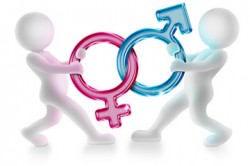What is Gender Dysphoria?
Issues surrounding gender can easily go unnoticed when a person’s sense of self “naturally” coincides with cultural expectations. For a person whose sense of gender identity contradicts societal expectations, his or her quality of life will likely suffer.
People affected by gender dysphoria, also known as gender identity disorder, experience a strong identification with the opposite sex in terms of how a person experiences his or her gender identity. While seemingly tied in with sexual orientation, gender dysphoria has more to do with a person’s identity than sexual preference in partners.
Though gender dysphoria affects only a small percentage of the overall population, it’s nonetheless distressing for those who must live and work within everyday society.
Diagnostic Criteria
According to the U. S. National Library of Medicine, the overriding issues defining gender dysphoria stem from the disparity between a person’s biological gender and the gender with which he or she actually identifies. In order for a diagnosis of gender-based dysphoria to apply, a person must meet four diagnostic criteria –
- Strong, ongoing identification with the opposite gender or sex
- Ongoing discontent over a person’s existing sexual assignment
- No physical intersex characteristics
- Significant distress that causes problems in other important areas of a person’s life
Gender Dysphoria vs. Sexual Orientation
Signs of gender dysphoria often become apparent in childhood, especially during the stage when children learn to distinguish males from females. While a gender identity disorder may well influence a person’s overall sexual orientation, the condition exists apart from any particular orientation or preference a person may have, according to Columbia University. In effect, a biological male struggling with this condition would feel like a woman trapped inside a man’s body and vice versa for biological females.
Symptoms

Individuals with gender identity disorder may feel as if they were born in the wrong body.
Symptoms of gender dysphoria tend to vary based on the age of the person. For children, symptoms may include –
- Wanting to be the opposite sex and stating it outright
- A strong dislike for their own genitals
- Believing they will grow up to be the opposite sex
- Rejected by peers and feeling alone as a result
With adults, symptoms become more so behavioral and/or acted upon –
- Cross-dressing
- Displaying gestures and habits characteristic of the opposite sex
- Depression symptoms
- Anxiety symptoms
Lifestyle Effects
While the overall definition of gender dysphoria remains the same, different people may adapt to the condition in different ways. Whereas one person may choose to live as a cross-dresser, the distress and discomfort experienced by another may drive him or her to seek out sex reassignment surgery.
As gender identity conflicts can have a considerable impact on a person’s sense of identity and overall mindset, affected individuals may well be attracted to same-sex partners, though this is not always the case.
Complications
Living with gender dysphoria can become a source of considerable distress and emotional turmoil. The ongoing rejection and humiliation experienced by a person can cause other problems to develop, some of which include –
- Depression disorders
- Isolation
- A diminished self-concept
- Suicidal thoughts and/or acts
Considering the complications that can arise, diagnosing and treating gender dysphoria early on can greatly enhance a person’s overall quality of life in the long run.





